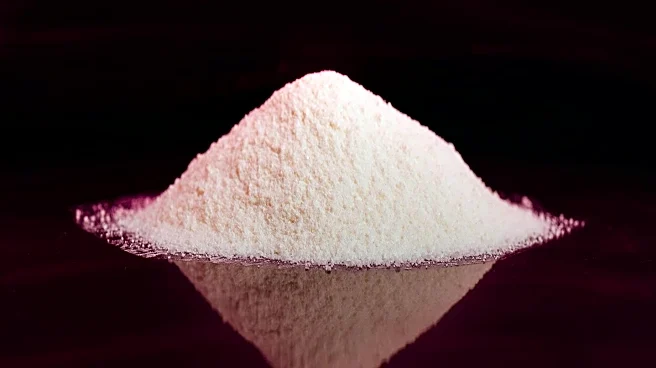What's Happening?
A recent investigation by Consumer Reports has uncovered concerning levels of lead in protein powders and shakes. The study tested 23 products, revealing that approximately 70% contained lead levels exceeding
120% of Consumer Reports' threshold of concern, which is set at 0.5 micrograms per day. This finding is particularly alarming given the average American adult's daily exposure to lead through diet, which is estimated at up to 5.3 micrograms according to a 2019 FDA analysis. The investigation highlights the lack of regulatory oversight by the Food and Drug Administration, which does not review or test supplements like protein powders before they reach the market. Consumer Reports has advised against the daily use of most protein powders due to their high levels of heavy metals, suggesting that they are not necessary for meeting protein goals.
Why It's Important?
The findings from Consumer Reports are significant as they raise public health concerns regarding the consumption of protein supplements, which have gained popularity amid the nutrition and wellness trend. High levels of lead exposure can lead to serious health issues, including immune suppression, reproductive problems, kidney damage, and high blood pressure. Vulnerable groups such as pregnant individuals and children are at greater risk, with childhood exposure potentially causing long-term harm. The report underscores the need for consumers to be cautious about incorporating protein powders into their diets and calls for greater regulatory scrutiny to ensure product safety.
What's Next?
Consumer Reports has recommended that consumers limit their intake of certain protein products, suggesting some be consumed only occasionally or once a week. The organization has also reached out to manufacturers for responses, with mixed results. Some companies have acknowledged the presence of lead as a naturally occurring element, particularly in plant-based products, and have stated that their products undergo safety testing. However, the lack of response from several manufacturers highlights the need for increased transparency and accountability in the industry.
Beyond the Headlines
The investigation sheds light on broader issues within the supplement industry, including the challenges of regulating naturally occurring elements like lead in food products. It also raises ethical questions about consumer safety and the responsibility of manufacturers to ensure their products do not pose health risks. Long-term, this could lead to calls for stricter regulations and testing standards to protect consumers from potential harm.









